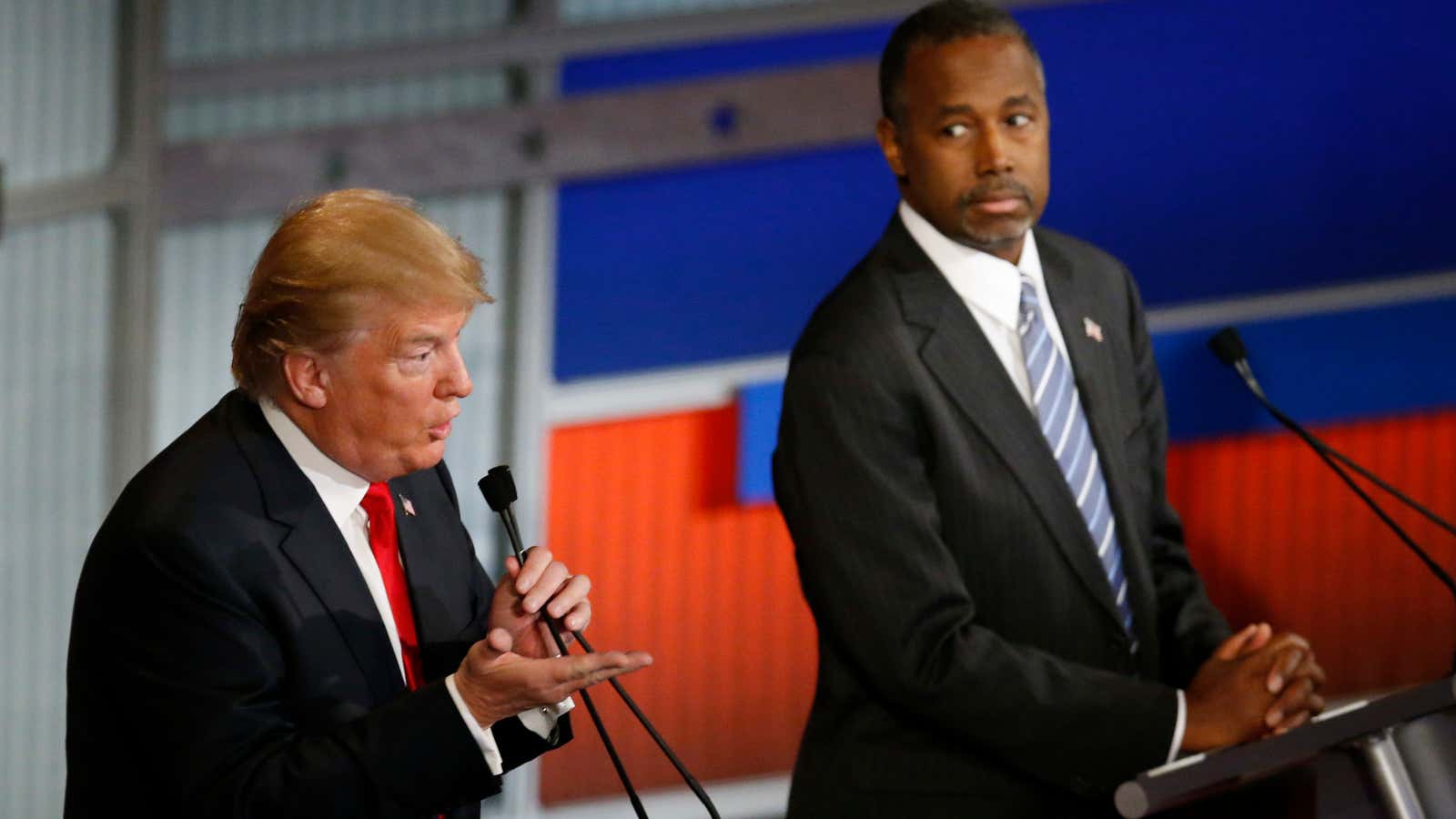Like most political liberals, I disagree with both Donald Trump and Ben Carson on almost every issue. As the son of immigrants, I’m offended by Trump’s xenophobia, and as a former Homeland Security official, I question the wisdom behind Carson’s support for torture. Yet, as one of many passionate but politically disillusioned millennials, I cannot help but find inspiration in the extraordinary political ascent of two of the GOP’s leading candidates for the 2016 presidential nomination.
Trump and Carson’s political success—even at this admittedly early stage in the race—is a reminder that you don’t need to be a career politician in order to have an impact on public policy; indeed, the American political system is ripe for disruption. This is encouraging because it seems that any hope of resolving long-standing political stalemates (e.g., immigration, campaign financing, gun control) will require disruptive ideas that radically transform the status quo, ideas that have so far eluded the current crop of career politicians.
An appealing path to the White House
Millennials say they’d like to make a difference—multiple studies have shown that 18 to 34 year olds want to have a positive social impact. Yet despite this expressed desire, young people decidedly do not want to become career politicians. According to Running From Office: Why Young Americans Are Turned Off To Politics, a book published this spring by political scientists Jennifer Lawless and Richard Fox, 89% of millennials said they had never considered running for office. This renders the trajectories of high-profile politicians such as Marco Rubio, Jeb Bush, and even Barack Obama—all of whom either ran for public office before their 35th birthday or were born into political families—largely unrelatable.
Meanwhile, according to the National Center for Education Statistics, the most popular major for college graduates in recent years continues to be business, with “health professions and related programs” also a highly ranked option. While the level of success—and name recognition—Trump and Carson have achieved in their respective fields is relatively rare, the career choices they made (running a business, going to medical school) are ones with which millennials can identify.
The upshot? Millennials can indeed reconcile desirable career goals with their passion for public service.
Salvation through disruption
Having come of age during the Great Recession and amidst 24/7 news coverage of political gridlock, millennials are understandably distrustful of large institutions and hungry for disruption. Since peaking in 2010, millennial unemployment has remained high despite the fact that millennials recently surpassed Baby Boomers as the largest generation in the US labor force.
Disillusioned with greedy corporations and incompetent politicians, it is no wonder less than 17% of millennials trust Congress to “do the right thing all or most of the time,” according to a 2014 survey conducted by the Harvard Institute of Politics.
Importantly, I’m not arguing for more millennials to jump into politics out of undergrad. In 2014, the GOP ushered in a young and relatively diverse rookie class that included 37-year-old Tom Cotton, a first-year Senator from Arkansas, and 30-year-old Elise Stefanik, a Republican Congresswoman from New York State. There will always be a small portion of young people who do want to run for office at a younger age. Trump and Carson offer a model for the remaining 89% of us.
It won’t be easy; some of our most beloved presidents—Abraham Lincoln, FDR, Harry Truman—have been lifelong politicians and so far there’s not much evidence that “outsiders” fare much better. But ultimately, despite the common refrain that the American political system is “rigged,” it seems clear that there is room—and appetite—for a different kind of candidate, one who might not have gone straight from law school to politics. Indeed, it’s unlikely that a rigged political system controlled by corporate interests would tolerate Donald Trump as the Republican frontrunner less than 90 days before the primaries. Perhaps the American political system is not beyond reinvention; and this should ultimately encourage a generation that relishes disrupting outdated institutions.
There are many reasons to be frustrated by our current system of government, but complaining from the sidelines is unlikely to help. While it might seem a little absurd, perhaps the best hope for the future of American politics is a generation of young men and women empowered by the thought: “If Trump could do it, so can I.”
